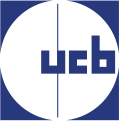- UCB (company)
-
UCB S.A. 
Type Société anonyme Traded as Euronext: UCB Industry Pharmaceuticals Founded 1928 Headquarters Brussels, Belgium Key people Karel Boone (Chairman), Roch Doliveux (CEO) Products Biopharmaceuticals Revenue €3.218 billion (2010)[1] Operating income €204 million (2010)[1] Profit €103 million (2010)[1] Total assets €8.969 billion (end 2010)[1] Total equity €4.592 billion (end 2010)[1] Employees 8,900 (end 2010)[1] Website www.ucb.com UCB (Union chimique belge) is a multinational biopharmaceutical manufacturing company headquartered in Brussels, Belgium.
Contents
History
UCB was founded on 18 January 1928 by Emmanuel Janssen, a Belgian businessman. Initially focused on industrial chemicals ( it was one of the first companies to distill amonia from coal ), the company also included a small pharmaceutical division based around Meurice Laboratories.
In the early 1950s, UCB set up a research centre where new medicines such as Atarax (hydroxyzine) were developed. Successful sales enabled the pharmaceutical division to expand, and led to the discovery of another important compound, called piracetam. This was marketed in the 1970s as Nootropil and used to treat memory and balance problems. It remains one of UCB's key products. At this time, UCB was a company focusing on three core areas: pharmaceuticals, chemicals and films.
The success of Nootropil made it possible for UCB to build a modern pharmaceutical site in Braine-l'Alleud, south of Brussels. There, UCB developed Zyrtec (cetirizine), a blockbuster antihistamine. Other important products have followed including Keppra (levetiracetam), Xyzal (levocetirizine), and Cimzia (certolizumab pegol).
At the end of 2002, the chemicals and films divisions were merged and UCB added the resins, additives and adhesives activities of Solutia, to form the surface specialties division. The films part has since been sold to Innovia Films in September 2004. The chemicals division, Methylamines and Derivatives was spun off and later sold to form the company Taminco.
In May 2004, UCB acquired the British biotechnology company Celltech, followed in March 2005 by the sale of the surface specialties business to Cytec Industries. By divesting all of its non-pharmaceutical activities, and acquiring Celltech, UCB transformed itself into a global biopharmaceutical company.[2]
In 2006, UCB started the purchase of the German pharmaceutical company Schwarz for €4.4 billion[3]. As of July 2007[update], UCB holds approximately 87% of Schwarz's outstanding shares. The purchase of Schwarz enabled UCB to introduce two new drugs against CNS disorders: Neupro (rotigotine), a transdermal patch for treatment of Parkinson's disease and Vimpat (lacosamide), a new anticonvulsant. Another new drug of the Schwarz portfolio, Toviaz (fesoterodine), a compound to treat overactive bladder, was licensed to Pfizer in 2006.
Operations
The Company's efforts are focussed on treatments for severe diseases treated by specialists, particularly in the fields of central nervous system (CNS) disorders (including epilepsy), inflammatory disorders (including allergy), and oncology.
References
- ^ a b c d e f "Annual Report 2010". UCB. http://www.ucb.com/_up/ucb_com_investors/documents/2010%20annual%20report%20-%20ENG%20-%20dynamic.pdf. Retrieved 22 April 2011.
- ^ Heather Timmons (May 19, 2004). "Belgian drugmaker seeks to buy Celltec". The New York Times. http://www.nytimes.com/2004/05/19/business/belgian-drug-maker-seeks-to-buy-celltech.html?pagewanted=print.
- ^ UCB S.A. Press Release of 25 September 2006; accessed on 12 September 2008.
External links
 BEL20 companies of Belgium
BEL20 companies of BelgiumAckermans & van Haaren · Ageas · Anheuser-Busch InBev · Befimmo-Sicafi · Bekaert · Belgacom · Cofinimmo · Colruyt · Delhaize Group · Dexia · GBL · GDF Suez · KBC Groep · Mobistar · Nyrstar · Omega Pharma · Solvay · Telenet Group · UCB · Umicore
Categories:- Companies listed on the Euronext exchanges
- BEL20 companies
- Belgian brands
- Pharmaceutical companies of Belgium
Wikimedia Foundation. 2010.
